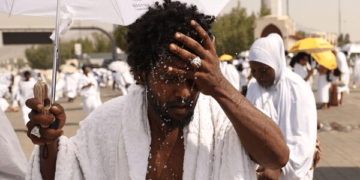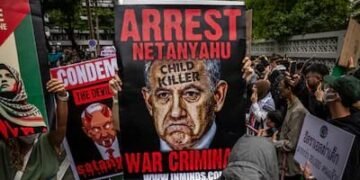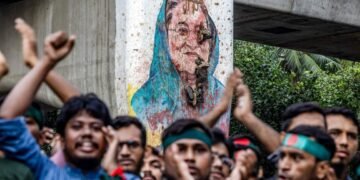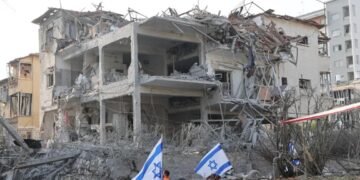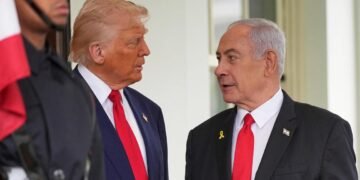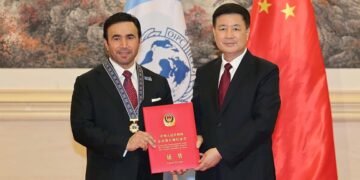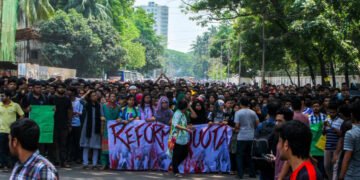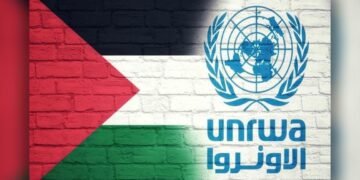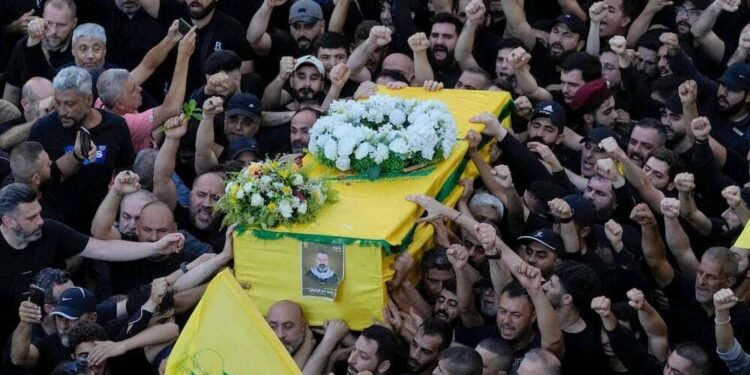Sources say Iran-backed groups aim to strengthen Hamas’s position in negotiations with Israel amid reports of progress in talks
Yemen’s Houthi rebels and Iraqi militias have informed their ally Hamas they will cease attacks on Israeli targets if a ceasefire is reached in Gaza, aiming to provide the Palestinian faction with greater flexibility during negotiations, three sources within the armed factions told press on Thursday.
The stance, following Hezbollah’s confirmation that Hamas was negotiating on behalf of the Iran-backed militias in the region, came as the militant group and Israel had made “significant concessions” during intense talks over recent days, according to two sources involved in the process.
They said Hamas and Israel had reached a “framework agreement” for a ceasefire that would stop the devastating nine-month-long war, but cautioned that timelines and many “intricate details” are yet to be ironed out.
Hassan Nasrallah, the leader of the powerful Lebanese Hezbollah, said on Wednesday the so-called anti-Israel “Axis of Resistance” would accept any deal to which Hamas agrees, despite Israel’s warning that a ceasefire would not affect other fronts and would not end its war with the heavily armed group.
White House National Security spokesman John Kirby told press on Thursday that attacks from the Houthis and other Iran-backed groups should stop immediately.
“They need to stop now,” Mr Kirby said, speaking on the sidelines of the Nato summit in Washington.

“These are attacks that never should have happened in the first place. President [Joe] Biden put together a coalition of some 20 nations in the Red Sea to shoot those attacks down, they need to stop now.”
The pledges from Hamas’s allies come as the Middle East stands on the precipice of large-scale regional war, as tensions rise between Israel and Iran-backed groups in Lebanon, Yemen, Syria and Iraq. Israel has long accused Iran, its arch-enemy, of encircling it with hostile forces, including Hamas in Gaza.
“We are involved in high co-ordination with the countries and factions of the axis regarding this matter [ceasefire], and the brothers in Hamas are authorised to negotiate on behalf of the resistance movements in Gaza and the other fronts,” a member of the Houthis’ political council said.
“We in Yemen have linked our military operations to what the brothers in Hamas agree on.”
Another Houthi official confirmed that the group, which has been attacking vessels in the strategic shipping lanes of the Red Sea in support of Hamas, has communicated its stance to the Hamas leaders involved in the negotiations.
In Iraq, the armed groups have also sent a similar message to the Palestinian group, a politician with links to the armed factions told the press.
“Any ceasefire deal reached between Hamas and the Zionist enemy will apply to all within the Islamic Resistance in Iraq,” he said, referring to the umbrella groups of the powerful pro-Tehran Shiite militias.
Hamas continues to update Iraqi factions on the developments in negotiations, he said, adding that earlier this week, a delegation representing various Palestinian factions visited Iraq and met heads of armed groups.
Framework agreement
Gaza ceasefire talks resumed this week as mediation efforts to pause the war gain momentum. The talks in Doha and Cairo initially involved mid to high-level mediators from the US, Egypt and Qatar as well as representatives from Israel and Hamas.
Later, CIA director William Burns, Egyptian intelligence chief Abbas Kamel and his Israeli counterpart, the Mossad’s David Barnea, joined the negotiations.
According to the two sources involved in the process, the “framework agreement” reached covers security and government arrangements in postwar Gaza as well as the reconstruction of the coastal territory.
However, “there’s still a long way to go”, warned one of the sources. “The whole thing can collapse when the agreement is filled out or during implementation.”
Mediators from the US and its Arab allies Egypt and Qatar have been trying for months without success to broker a Gaza ceasefire. The only truce in the war, brokered by the same mediators, lasted a week and ended on December 1 after the release of about 100 hostages in exchange for Palestinian detainees.
The war started when Hamas attacked southern Israel in October, killing about 1,200 people and taking another 240 hostage. Israel responded with a relentless military campaign that has to date killed more than 38,300 Palestinians, with more than twice as many injured 80 per cent of the territory’s 2.3 million residents displaced.
The war has also reduced to rubble most of the territory’s built-up areas and created a humanitarian crisis, with many now in the tiny but densely populated strip facing hunger while famine looms over its north.
The chances of clinching a deal significantly increased when Hamas softened its conditions last week, dropping its insistence that Israel must commit in writing to a permanent ceasefire at the end of the first phase of the agreement. Instead, the group now wants guarantees in writing from the three mediators that talks to reach a permanent ceasefire will commence as soon as the first six-week phase begins.
Israel has given a “conditional nod” to Hamas’s new positions, hinging its final position on the satisfaction of its demands on the timetable and details of the release of hostages. Palestinians detained in Israeli prisons will be freed in exchange for Israeli hostages, mirroring the week-long exchange in November.
Meanwhile, domestic opposition to Israeli Prime Minister Benjamin Netanyahu has grown over his perceived failure to agree to a ceasefire, with thousands of Israelis rallying weekly in Tel Aviv and other Israeli cities to call for a deal. Hamas, which has ruled Gaza since 2007, appears to also be coming under popular pressure to accept a deal.
The two sources said one of the ideas on the table is that postwar Gaza will be governed by a UN-led administration that includes a Palestinian component, but not from Hamas nor the West Bank-based Palestinian Authority led by President Mahmoud Abbas. A UN force could also be stationed in the enclave to maintain security, they added.
“Neither the US nor Israel want Hamas or the Palestinian Authority to play a role in the transitional period in Gaza,” said one of the sources.
Separately, Egypt has proposed to Israel that an “international entity” with Palestinian representation takes charge of the Palestinian side of the Rafah crossing between Gaza and Egypt. Israel captured that side of the border point in May.
The Egyptian proposal also envisages an Israeli “redeployment” outside the border strip in return for putting in place security measures such as a wall fitted with security cameras and sensors, explained the two sources.
Israel has alleged underground tunnels running under the Egypt-Gaza border have been used to smuggle weapons, money and personnel into the territory and the hands of Hamas. Egypt, which shut down the Rafah crossing in response to Israel’s capture of its Palestinian side, has categorically denied the allegations.
Hamza Hendawi in Cairo, Sinan Mahmoud in Baghdad, Thomas Helm in Jerusalem and Mohamad Ali Harisi in Abu Dhabi contributed to this article; Source: The National






